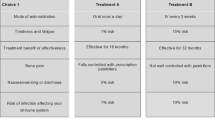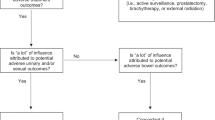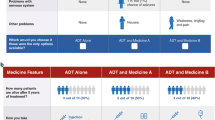Abstract
Purpose
In diseases where there is no real consensus regarding treatment modalities, promoting shared decision-making can contribute to improving safety and quality of care. This is the case in low- or intermediate-risk localized prostate cancer (PC) treatment. The aim of this study was to investigate the preferences guiding men’s decisions regarding the characteristics of the treatment strategies for PC to help physicians adopt a more patient-centered approach.
Methods
This prospective multicenter study used a discrete choice experiment (DCE). The attributes and the modalities were identified from a qualitative study and a literature review. Relative preferences were estimated using a logistic regression model. Interaction terms (demographic, clinical and socio-economic characteristics) were added to the model to assess heterogeneity in preferences.
Results
652 men were enrolled in the study and completed a questionnaire with 12 pairs of hypothetical therapeutic alternatives between which they had to choose. Men’s choices were significantly negatively influenced by the risk of impotence and urinary incontinence, death, and the length and frequency of care. They preferred treatments with a rescue possibility in case of deterioration or recurrence and the use of innovative technology. Surprisingly, the possibility of undergoing prostate ablation negatively influenced their choice. The results also highlighted differences in trade-offs according to socio-economic level.
Conclusion
This study confirmed the importance of considering patients’ preferences in the decision-making process. It appears essential to better understand these preferences to allow physicians to improve communication and promote case-by-case decision-making.
Similar content being viewed by others
References
Elwyn G, Frosch DL, Kobrin S (2016) Implementing shared decision-making: consider all the consequences. Implement Sci 11:114. https://doi.org/10.1186/s13012-016-0480-9
Mohler JL, Antonarakis ES, Armstrong AJ et al (2019) Prostate cancer, version 2.2019, NCCN Clinical Practice Guidelines in Oncology. J Natl Compr Cancer Netw JNCCN 17:479–505. https://doi.org/10.6004/jnccn.2019.0023
Resnick MJ, Koyama T, Fan K-H et al (2013) Long-term functional outcomes after treatment for localized prostate cancer. N Engl J Med 368:436–445. https://doi.org/10.1056/NEJMoa1209978
Hamdy FC, Donovan JL, Lane JA et al (2016) 10-year outcomes after monitoring, surgery, or radiotherapy for localized prostate cancer. N Engl J Med 375:1415–1424. https://doi.org/10.1056/NEJMoa1606220
Say RE, Thomson R (2003) The importance of patient preferences in treatment decisions: challenges for doctors. BMJ 327:542–545. https://doi.org/10.1136/bmj.327.7414.542
Sanda MG, Cadeddu JA, Kirkby E et al (2018) Clinically localized prostate cancer: AUA/ASTRO/SUO Guideline. Part II: recommended approaches and details of specific care options. J Urol 199:990–997. https://doi.org/10.1016/j.juro.2018.01.002
Ihrig A, Maatouk I, Friederich HC et al (2022) The treatment decision-making preferences of patients with prostate cancer should be recorded in research and clinical routine: a pooled analysis of four survey studies with 7169 patients. J Cancer Educ Off J Am Assoc Cancer Educ 37:675–682. https://doi.org/10.1007/s13187-020-01867-2
Schaede U, Mahlich J, Nakayama M et al (2018) Shared decision-making in patients with prostate cancer in Japan: patient preferences versus physician perceptions. J Glob Oncol 4:1–9. https://doi.org/10.1200/JGO.2016.008045
Wallis CJD, Zhao Z, Huang L-C et al (2022) Association of treatment modality, functional outcomes, and baseline characteristics with treatment-related regret among men with localized prostate cancer. JAMA Oncol 8:50–59. https://doi.org/10.1001/jamaoncol.2021.5160
Jones CU, Hunt D, McGowan DG et al (2011) Radiotherapy and short-term androgen deprivation for localized prostate cancer. N Engl J Med 365:107–118. https://doi.org/10.1056/NEJMoa1012348
Ryan M, Gerard K, Amaya-Amaya M (2008) Using discrete choice experiments to value health and health care. Springer Academic Publishers
Eliasson L, de Freitas HM, Dearden L et al (2017) Patients’ preferences for the treatment of metastatic castrate-resistant prostate cancer: a discrete choice experiment. Clin Ther 39:723–737. https://doi.org/10.1016/j.clinthera.2017.02.009
Lloyd A, Penson D, Dewilde S, Kleinman L (2008) Eliciting patient preferences for hormonal therapy options in the treatment of metastatic prostate cancer. Prostate Cancer Prostatic Dis 11:153–159. https://doi.org/10.1038/sj.pcan.4500992
Sculpher M, Bryan S, Fry P et al (2004) Patients’ preferences for the management of non-metastatic prostate cancer: discrete choice experiment. BMJ 328:382. https://doi.org/10.1136/bmj.37972.497234.44
de Bekker-Grob EW, Bliemer MCJ, Donkers B et al (2013) Patients’ and urologists’ preferences for prostate cancer treatment: a discrete choice experiment. Br J Cancer 109:633–640. https://doi.org/10.1038/bjc.2013.370
Enel C, Matte A, Berchi C et al (2013) Prostate cancer: how do patients choose their treatment? Bull Cancer (Paris) 100:191–199. https://doi.org/10.1684/bdc.2013.1707
Lancsar E, Louviere J (2008) Conducting discrete choice experiments to inform healthcare decision making: a user’s guide. Pharmacoeconomics 26:661–677. https://doi.org/10.2165/00019053-200826080-00004
Bergeron J, Landry M, Bélanger D (1976) The development and validation of a French form of the state-trait anxiety inventory. Cross-Cult Anxiety 1:41–50
Lancsar E, Louviere J (2006) Deleting “irrational” responses from discrete choice experiments: a case of investigating or imposing preferences? Health Econ 15:797–811. https://doi.org/10.1002/hec.1104
Härter M, Moumjid N, Cornuz J et al (2017) Shared decision making in 2017: International accomplishments in policy, research and implementation. Z Evidenz Fortbild Qual Im Gesundheitswesen 123–124:1–5. https://doi.org/10.1016/j.zefq.2017.05.024
Showalter TN, Mishra MV, Bridges JF (2015) Factors that influence patient preferences for prostate cancer management options: a systematic review. Patient Prefer Adherence 9:899–911. https://doi.org/10.2147/PPA.S83333
Lindsay J, Uribe S, Moschonas D et al (2021) Patient satisfaction and regret after robot-assisted radical prostatectomy: a decision regret analysis. Urology 149:122–128. https://doi.org/10.1016/j.urology.2020.12.015
Christie DRH, Sharpley CF, Bitsika V (2015) Why do patients regret their prostate cancer treatment? A systematic review of regret after treatment for localized prostate cancer. Psychooncology 24:1002–1011. https://doi.org/10.1002/pon.3776
Hoffman RM, Lo M, Clark JA et al (2017) Treatment decision regret among long-term survivors of localized prostate cancer: results from the prostate cancer outcomes study. J Clin Oncol 35:2306–2314. https://doi.org/10.1200/JCO.2016.70.6317
van Stam M-A, Aaronson NK, Bosch JLHR et al (2020) Patient-reported outcomes following treatment of localised prostate cancer and their association with regret about treatment choices. Eur Urol Oncol 3:21–31. https://doi.org/10.1016/j.euo.2018.12.004
Hoffman RM, Van Den Eeden SK, Davis KM et al (2018) Decision-making processes among men with low-risk prostate cancer: a survey study. Psychooncology 27:325–332. https://doi.org/10.1002/pon.4469
Covvey JR, Kamal KM, Gorse EE et al (2019) Barriers and facilitators to shared decision-making in oncology: a systematic review of the literature. Support Care Cancer Off J Multinatl Assoc Support Care Cancer 27:1613–1637. https://doi.org/10.1007/s00520-019-04675-7
Reyna VF, Nelson WL, Han PK, Pignone MP (2015) Decision making and cancer. Am Psychol 70:105–118. https://doi.org/10.1037/a0036834
Sciarra A, Frisenda M, Maggi M et al (2021) Prospective comparative trial on nerve-sparing radical prostatectomy using a robot-assisted versus laparoscopic technique: expectation versus satisfaction and impact on surgical margins. Cent Eur J Urol 74:169–177. https://doi.org/10.5173/ceju.2021.0017.R3
Cunningham M, Murphy M, Sweeney P, Richards HL (2022) Patient reported factors influencing the decision-making process of men with localised prostate cancer when considering active surveillance-A systematic review and thematic synthesis. Psychooncology 31:388–404. https://doi.org/10.1002/pon.5832
Smith A, “Ben”, Rincones O, Mancuso P, et al (2022) Low conflict and high satisfaction: Decisional outcomes after attending a combined clinic to choose between robotic prostatectomy and radiotherapy for prostate cancer. Urol Oncol 40:8.e1-8.e9. https://doi.org/10.1016/j.urolonc.2021.05.007
Huls SPI, de Bekker-Grob EW (2022) Can healthcare choice be predicted using stated preference data? The role of model complexity in a discrete choice experiment about colorectal cancer screening. Soc Sci Med 315:115530. https://doi.org/10.1016/j.socscimed.2022.115530
Siegel RL, Miller KD, Fuchs HE, Jemal A (2022) Cancer statistics, 2022. CA Cancer J Clin 72:7–33. https://doi.org/10.3322/caac.21708
de Vries SH, Postma R, Raaijmakers R et al (2007) Overall and disease-specific survival of patients with screen-detected prostate cancer in the European randomized study of screening for prostate cancer, section Rotterdam. Eur Urol 51:366–374. https://doi.org/10.1016/j.eururo.2006.07.052. (discussion 374)
Acknowledgements
The authors would like to thank Alexandre Matte for the literature review work performed at the start of the study, Alexandra Lamotte Felin for the logistic management of the study and Charley Robert-Viard for his help with formatting the article. They also thank Suzanne Rankin (Dijon-Bourgogne University Hospital) for proofreading and editing the manuscript.
Funding
This work was supported entirely by the National Cancer Institute (INCa) [2012-09/293/AB-SD]. The funding agreement ensured the authors’ independence in designing the study, interpreting the data, writing, and publishing the report.
Author information
Authors and Affiliations
Contributions
(1) Study: A. Conception and design of the study, B. Coordination, C. Supervision of the study. A: CL, CBi, LC. B: CL. C: CL, AB, CBe, CBi, LC. (2) Statistical analysis and interpretation: A. Design, B. Execution, D. Critical review and interpretation. A: AB and CBe. B: AB. C: CL, CBe, CBi, LC. (3) Manuscript: A. Writing the first draft, B. Writing the specific part of the statistical analysis, C. Critical review, D. Final approval. A: CL. B: AB. C: CL, CBe, CBi, OC, GB, FP, FB, OH, NK, SB, GF, AV, JL-M, BP, LC. D: CL, LC.
Corresponding author
Ethics declarations
Conflict of interest
There are any financial relationship or conflict of interest between any of the authors.
Ethical approval
The protocol was approved by the ethics committee CPP Est I (February 2013): ID RCB: 2012-A01281-42.
Iinformed consent
Written informed consent was obtained from each pilot and main study patient. Patients of the study have given prior written consent to collect data.
Additional information
Publisher's Note
Springer Nature remains neutral with regard to jurisdictional claims in published maps and institutional affiliations.
Supplementary Information
Below is the link to the electronic supplementary material.
Rights and permissions
Springer Nature or its licensor (e.g. a society or other partner) holds exclusive rights to this article under a publishing agreement with the author(s) or other rightsholder(s); author self-archiving of the accepted manuscript version of this article is solely governed by the terms of such publishing agreement and applicable law.
About this article
Cite this article
Lejeune, C., Bourredjem, A., Binquet, C. et al. Eliciting men’s preferences for decision-making relative to treatments of localized prostate cancer with a good or moderate prognosis. World J Urol 41, 1541–1549 (2023). https://doi.org/10.1007/s00345-023-04416-w
Received:
Accepted:
Published:
Issue Date:
DOI: https://doi.org/10.1007/s00345-023-04416-w




